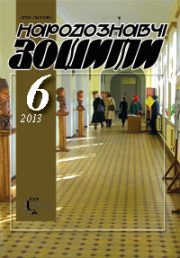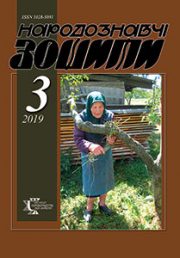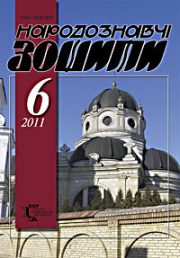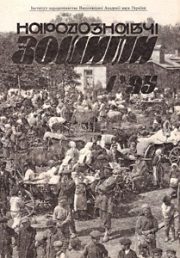The Ethnology Notebooks. 2019, № 4 (148), 915—927
УДК 398(=161.2):314.151.3-054.74(=161.2)(438)
DOI https://doi.org/10.15407/nz2019.04.915
KACHMAR Maria
ORCID ID: https://orcid.org/0000-0002-7811-9576
Candidate of sciences in Philology;
Research fellow at the Institute of Ethnology
of the National Academy of Sciences of Ukraine
15, Svobody Avenue, 79000, Lviv, Ukraine.
Contacts: e-mail: mariakachmar@ukr.net
Abstract. The great and bloody twentieth century in Ukrainian history is peculiarly reflected in the oral tradition. The article is devoted to the consideration of folk stories and retellings about the deportation of Ukrainians from ethnic Ukrainian lands in Poland in 1944—1947. The source and the object of work are the texts of folk tales and retellings, recorded in 2012 from residents of the village Tuliholovy of Horodok district of the Lviv region — immigrants from the Ukrainian villages of Pzemysl and Yaroslav districts of Poland. The thematic wealth of narratives, the plot-motive complex, the role and place of the narrator in the formation of the text (participant or witness of the event, translator of the received information) have been analyzed. The main attention is paid to the peculiarities of displaying historical events through the subjective perception of a participant or eyewitness, typical phenomena through individual fate, and the influence of the folklore tradition on the formation of texts. On the basis of analytical consideration of prose samples, the concept of historical and folklore memory is revealed, in the formation of the last emotional memory plays important role. The interaction of «historical truth» with individual and collective consciousness, that is, the development of the «artistic truth», is deduced in the works about the life of Ukrainians in Poland until 1944, the Polish-Ukrainian conflict as the main reason for resettlement, the destruction of Ukrainian villages (Pavlokoma and Piskorovichi), the resistance of Ukrainian underground, the organization of voluntary and forced deportations, the difficult road and inhuman conditions for the transportation of Ukrainians, the establishment of life in a new home, adaptation in the new society, where the church and religions played an important unifying role on activity, memory of the «small» homeland, which is usually idealized. Structural-semantic, structural-semiotic, textual, comparative, interdisciplinary methods, method of field research were used for the purpose and tasks of the work.
Keywords: deportation, historical memory, folklore memory, folk stories, motive, ethnic Ukrainian lands.
Received 6.06.2019
REFERENCES
Myhanych, S.V. (1986). Oral folk stories. The question of poetics. Kyiv: Naukova dumka [in Ukrainian].
Myshanych, S. (1986). Oral Chronicles of People’s Life. In S. Myshanych (Ed.). Folk stories (pp. 5—16). Kyiv: Dnipro [in Ukrainian].
Sokil, V. (2017). Folklore prose about Holodomor of the twentieth century in Ukraine: the paradigm of the text. Monograph. Lviv: Institute of Ethnology of the National Academy of Sciences of Ukraine [in Ukrainian].
Ivannikova, L. (2016). Dnipropetrovsk — Polovitsa — Kodak: folklore and historical memory. Folklore and ethnology, 3, 42—50 [in Ukrainian].
Khaliuk, L.M. (2013). Oral folk tales of Ukrainian immigrants of Lemkivshchyna, Kholmshchyna, Pidliashshia and Nadsiannia: genre-thematic specificity, artistic features. Kyiv: M.T. Rylsky Institute of Art, Folklore Studies and Ethnology Institute of the National Academy of Sciences of Ukraine [in Ukrainian].
Kuzmenko, O. (2010). Concept Motherland in the paradigm of artistic images of space in folk novelties about eviction (on the basis of their own records from the West Boykivshchyna). Literature. Folklore. Problems of poetics (Issue 34, pp. 210—220). Kyiv [in Ukrainian].
Kyrchiv, R. (2010). The twentieth century in Ukrainian folklore. Lviv: Institute of Ethnology of the National Academy of Sciences of Ukraine [in Ukrainian].
Drozd, R. & Halchak, B. (2013). History of Ukrainians in Poland in 1921—1989. Kharkiv: Gold Pages [in Ukrainian].
Vynogradska, G. (2008). Deportations of Ukrainians from Poland in 1944—1947: problems of periodization and the circumstances of resettlement (based on the materials of oral deportees). In East/West: historical and cultural collection. Special edition (Issue 11—12, pp. 243—250) [in Ukrainian].
Kovalchuk, S. & Petrova, N. (2018). Ukrainians of the western frontier in the resettlement processes on the Odesa region in the second half of the 40’s of the twentieth century (on materials of the State Archives of the Odesa region). In Ukrainian borderland: variability of traditional culture. Odessa ethnographic readings: collection of scientific works (pp. 131—140). Odesa: Odesa National University named after I.I. Mechnikov [in Ukrainian].
Pavliv, Yu. Z. (2018). Deportation of Ukrainians from the Polish-Ukrainian border area in 1944—1951 in the regional memory of Ukraine. The thesis for the academic degree of Candidate of Historical Sciences. Lviv [in Ukrainian].
Slyvka, Yu. (Ed.) (1996). Deportations: Western lands of Ukraine in the late 30’s — early 50’s. Documents, materials, memoirs: in three volumes (Vol. 1). Lviv: Institute of Ukrainian Studies named after I. Krypiakevych of the National Academy of Sciences of Ukraine [in Ukrainian].
In the millstones of history. Collection of memoirs and documents (2017). Kyiv: «Gramnma» [in Ukrainian].
Protsiuk, V. (Ed.) (2004). The book of memory. 1944—2014: the 60th anniversary of the Polish-Ukrainian bloody events on Zakerzonnia. Lviv [in Ukrainian].
Hlushko, M. (2017). Nadsiannia: localization and boundaries of the ethnographic region of Ukraine. Folklore and ethnology, 3, 7—15.
Serhiychuk, V. (1997). Tragedy of Ukrainians in Poland. Ternopil: Book and magazine publishing house «Ternopil» [in Ukrainian].
Vyatrovych, V.M. (2011). Second Polish-Ukrainian War. 1942—1947. Kyiv: Kyiv-Mohyla Academy [in Ukrainian].
Truhan, M. (1990). Ukrainians in Poland after the Second World War (1944—1984). In Notes of the Shevchenko Scientific Society (Vol. 208). New York; Paris; Sydney; Toronto [in Ukrainian].
Snihiryova, L. Symbols of water, fire, wind, earth in Ukrainian folk historical songs of the 15th — early 18th centuries. Retrieved from: http://er.nau.edu.ua/bitstream/NAU/13584/1/%D0%A1%D0%A2% D0%90%D0%A2%D0%A2%D0%AF%20%D0 % A1% D0% B8% D0% BC% D0% B2% D0% BE% D0% BB% D0% B8% 20% D0% B2% D0% BE% D0% B4% D0% B0 ….% D0 % A1% D0% BD% D0% B3% D0% B8% D1% 80% D1% 8C% D0% BE% D0% B2% D0% B0% 20% D0% 9B.% D0% 9C..pdf
Vygovsky, M. & Kucher, V. (1994). Zakerzonnia. Kyiv antiquity: popular scientific and literary magazine, 1, 94—102 [in Ukrainian].
Volynets, O. (2017). Religious factor in the Ukrainian ethno-creation (on the example of the UGCC). Ukrainian national idea: realities and prospects of development (Issue 17, pp. 54—58) [in Ukrainian].







